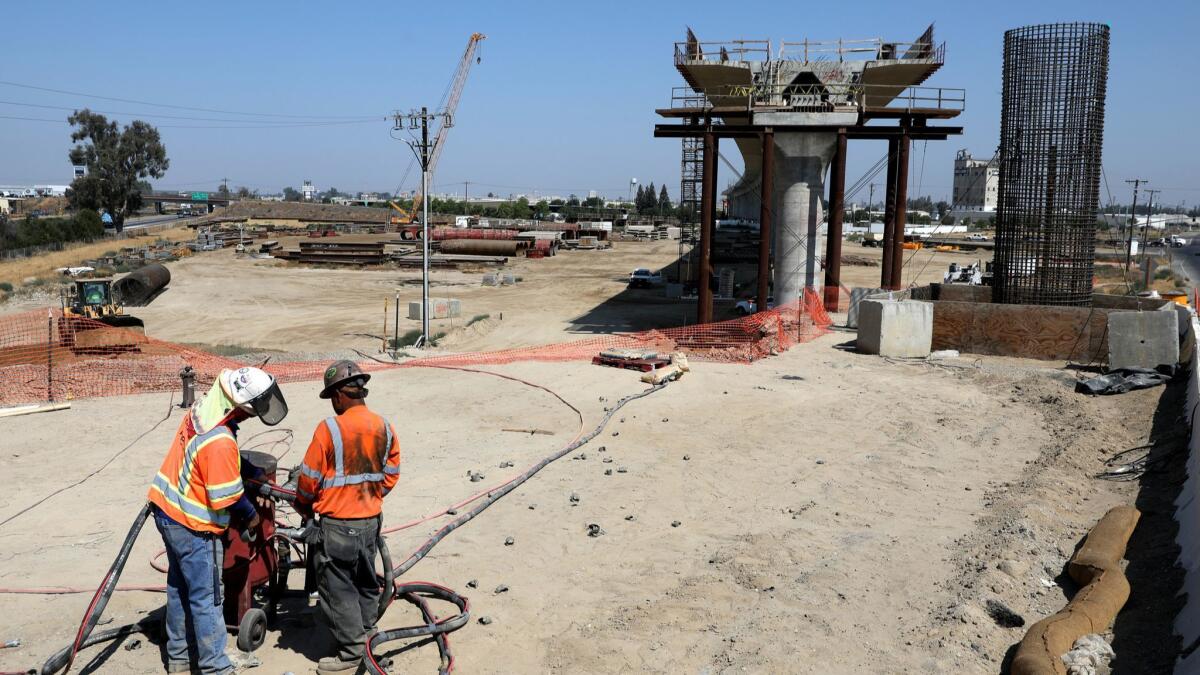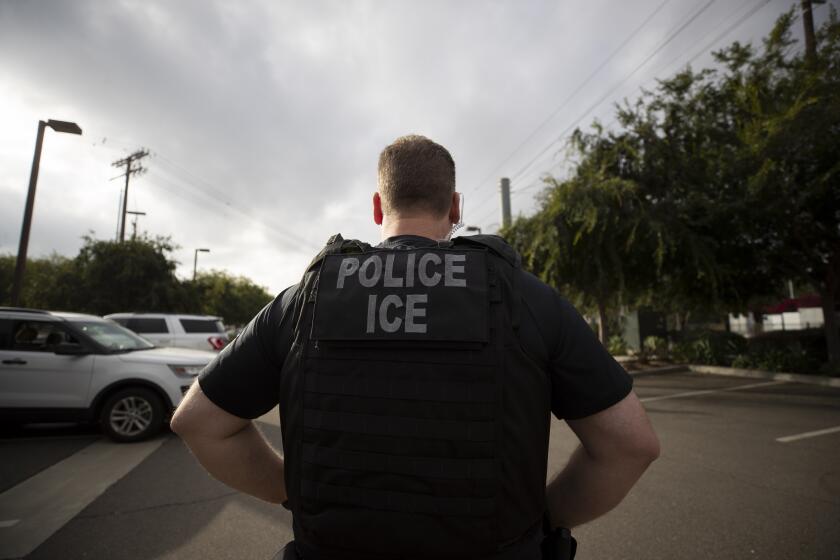Column: Bullet trains? Monorails? An end to speed limits? California’s transportation future is going to be a wild ride

- Share via
On Monday, my wife and daughter and I traveled home from Oakland by plane, and on landing in Burbank, my wife immediately did the math.
Door to door, our trip would have taken only 90 minutes longer if we had driven, and it would have been much cheaper.
Should we have traveled by sedan instead of by Southwest Airlines?
If the high-speed rail line were up and running, and both the time and price were somewhere between flying and driving, that might have been a preferable option.
But the train is stuck in limbo, and it’s not clear from his conflicting statements whether Gov. Gavin Newsomjust blew the whistle or leaped off the caboose. I want to slap myself for saying this, but you can hardly blame President Trump for seizing the opportunity to announce Tuesday that he’s trying to stiff us on a $929-million federal grant for the project.
Bullet train went from peak California innovation to the project from hell »
I’ll revisit the bullet train in a moment, but given the likelihood that we’re never going to get it together on rail, state Sen. John Moorlach of Orange County has pitched a bill to create lanes along the 5 and 99 Freeways through the Central Valley on which you could drive like hell, with no speed limits.
Buckle up, hit the gas and go. Burbank is a blur, Fresno a flash. You’re moving so fast, you can’t even smell the cow manure at Harris Ranch.
If Moorlach’s idea sounds crazy to you, there’s a reason for that.
It is.
By my calculations, half the people behind the wheel don’t know what they’re doing at any speed. Do we want lawmakers telling them to pretend they’re NASCAR drivers?
Back when Montana law allowed you to drive as fast as you considered “reasonable and prudent,” I rented a car in Great Falls and drove at the speed of sound (approximately) to Helena, where the Legislature was already considering a return to numerical speed limits.
When I hit 112 miles an hour in a Toyota Camry, my teeth rattled, the doors felt like they might blow off and the ghosts of my ancestors danced before me.
Even free-spirited, get-off-our-backs Montanans realized this was insane, and imposed a 75-mph speed limit in 1999.
But Californians are a delusional denomination, and we can’t let go of the dream that getting from here to there is going to be easier one day, even though all our choices guarantee the exact opposite. We keep growing, we move ever greater distances from our jobs, and 3 in 4 of us drive alone in our cars.
The Metropolitan Transportation Authority is studying congestion pricing, and my vote is yes, right now, let’s go. You take the most congested places in the region and charge people to drive in those areas when traffic is worst, which means that some drivers won’t bother. So there’s less traffic and less pollution.
Yeah, there are downsides. You don’t want a system that punishes the poor and gives rich people yet another break. But it’s worked elsewhere and it can work here, if planners could design a system that gives a break to low-income people who have to drive for their jobs. Then you take the congestion fees to build more and better transit.
The same MTA is considering transit options for the Sepulveda Pass, including tunneling through the mountain or stringing a monorail up and over the hill. That’s how desperate we are to relieve congestion — we can’t stop looking to Disneyland for answers.
OK, fine, but why are we always focused on the wrong ride? Big Thunder Mountain Railroad is the model we should be looking to. Make transit easy, fun and economical and people might ditch their cars. If the open-air Big Thunder train barreled over and through the pass, with passengers screaming and their hair flying as they blew by the Getty, I’d move to Sherman Oaks just to ride it every day.
But seriously, we’re never going to get anywhere, so to speak, without some smart local decisions and more clarity from Sacramento.
Chairman of troubled bullet train project resigns »
I appreciated Jerry Brown’s push for the bullet train as a centerpiece of his green agenda, but Uncle Jerry did a lousy job of selling the train, and his vision ended up being more of a hallucination. Way too many delays, massive cost overuns, millions in lawsuits and no funding in sight going forward. On Tuesday, the chairman of the high-speed rail board resigned.
As a candidate, Gavin Newsom was so wishy-washy you couldn’t tell where he stood. And when he finally spoke last week, he only created more confusion. One day it sounded like the train was dead; the next day Newsom said the media blew the story.
What did we do wrong?
We quoted him.
“But let’s be real,” Newsom had said in a speech. “The current project, as planned, would cost too much and respectfully take too long. There’s been too little oversight and not enough transparency. Right now, there simply isn’t a path to get from Sacramento to San Diego, let alone from San Francisco to L.A. I wish there were. However, we do have the capacity to complete a high-speed rail link between Merced and Bakersfield.”
Does that look unclear to you?
It doesn’t to me.
I figured it meant the train was off the rails. Others saw it the same way, and the backlash was immediate. Newsom’s people then scrambled to straighten things out, and the governor himself attempted to clarify, saying he hasn’t given up on the bigger project.
If that’s true, I’d like to make one recommendation to the governor.
Go to Disneyland, take a ride on the Big Thunder Mountain Railroad, and imagine traveling from San Diego to San Francisco on that.
Get more of Steve Lopez’s work and follow him on Twitter @LATstevelopez
More to Read
Sign up for Essential California
The most important California stories and recommendations in your inbox every morning.
You may occasionally receive promotional content from the Los Angeles Times.











